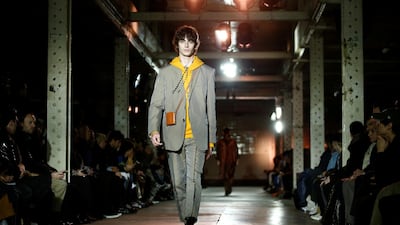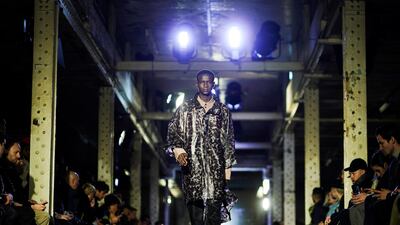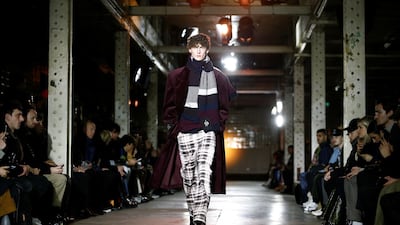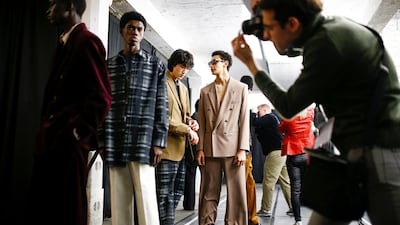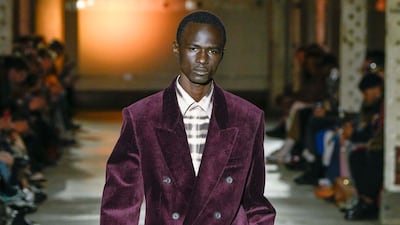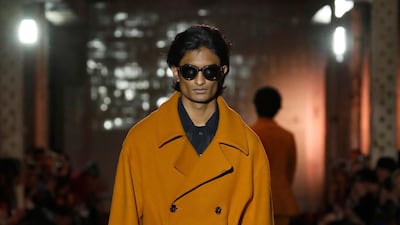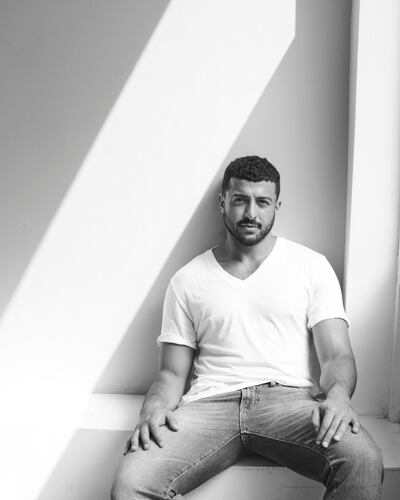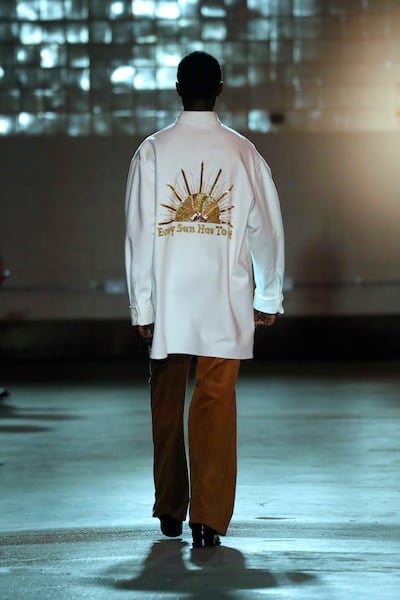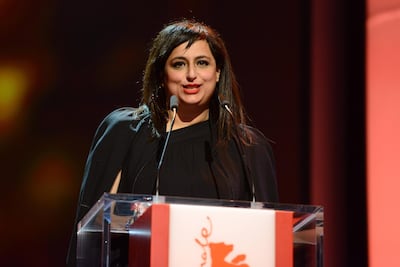The sun streaming through the showroom windows on a surprisingly bright winter's morning in London picks out the vibrant pattern of Sheikha Hoor Al Qasimi's down-filled jacket. In pinks, purples and white, this velvet coat of many colours could be a metaphor for the numerous roles she now juggles.
To her long list of jobs in the art world, including president and founding director of Sharjah Art Foundation and Sharjah Biennial, she has now added that of creative director of Qasimi, the menswear label launched by her late twin brother.
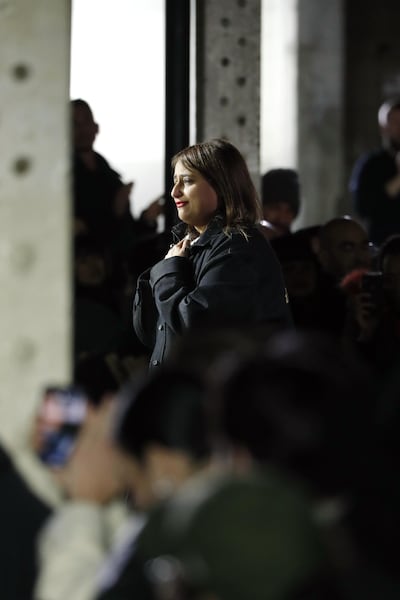
The previous afternoon was a deeply emotional experience for Hoor, as she took the catwalk bow for what was the last collection that Sheikh Khalid Al Qasimi had been working on before his sudden death at the beginning of July last year. He was 39.
Khalid Al Qasimi founded his eponymous menswear label in 2008, presenting it in Paris. He relaunched it in 2015 at London Fashion Week Men’s. He was known for his cross-cultural style of flowing oversized silhouettes, often described as “urban nomad”, with signature looks including tunics, tapered trousers, military jackets and blousons. In the past two seasons, he added more tailoring and a narrower silhouette. Although the new collection for autumn / winter 2020 was darker and moodier in theme, it retained the warm, earthy colours of the desert mixed with a print of burning embers.
Tailoring came in the form of loose-cut, double-breasted velvet suits in deep burgundy, and decadent mustard trench coats. Inky green leather was cut into sleeveless tunics and glossy coats, with suits in smoky greys and double-fronted cashmere.
Tortoiseshell appeared as all-in-ones for women, and as semi-transparent raincoats for men. Streetwear touches crept in as polo shirts, and long-sleeved technical tops worn with tailored trousers, while elements of homeliness appeared with blanket-stitched seams on chunky knitwear and reassuring twill overcoats.
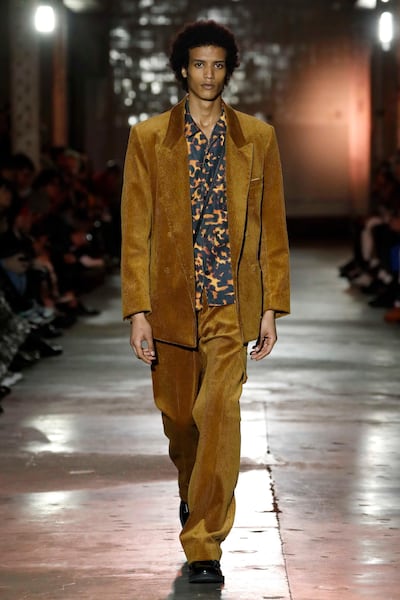
Poetry, philosophy and sociopolitical issues were never far from Khalid’s thoughts when he designed his collections, and there were messages on his garments that proved prescient.
His sister remembers her first day in his studio after his death – she found quotes on his mood board for this latest collection, including Arabic phrases from the Quran, "For I am near" and "We are never parted". It was all very emotive for her and the audience watching his swansong show at LFWM last month, where these messages appeared on T-shirts and sweatshirts. There was also a rising sun motif, a familiar symbol in Sharjah, with the dates 1980 to 2019 beneath it, along with many more poignant references to the loss of her brother. Suits and jackets carried labels on cuffs that read Renewal + Rebirth + Immortality.
“The show was emotionally draining, but it was very calm backstage beforehand,” says Hoor. “Everyone who had been close to him was there: the models, the music and production teams. Everyone who knew how he worked I wanted to stick with, as they will help me on this journey.”
Her brightly coloured coat could be regarded as a sign of positivity, of moving forward. On the morning after the show we discuss the collection that hangs on rails around the showroom, and her decision to uphold her brother’s legacy. “I wouldn’t think about it at first [after his death], but everyone kept telling me I had to do it. Everyone at the wake, the team here, even my mother said I had to do it. Khalid knows that I would go to the ends of the world for him, so I felt, 'OK, I already have seven jobs. I can do it'.”
Softly spoken, Hoor is undeniably good at multitasking but admits “this is a new world to me”. That first day in the studio, in particular, wasn’t easy. “It was really hard seeing the mood board with all those images and sitting in his office with all his things around. You don’t think he has gone and that is really hard to come to terms with,” she says.
However, Khalid frequently used his sister as a sounding board for ideas; they would message each other on Instagram with images. “We discussed everything. He worked with artists on projects and so we would discuss that, as I am very connected in the art world. We would have days out at museums and call it #twinsdayout. He would tell me about an artist’s work that he loved and ask if I knew them and I would say: ‘Yes, they are friends of mine.’”
That link with artists will continue in future collections. Hoor's first will be for spring / summer 2021, showing at LFWM in June. Working with Qasimi's head of design, Adam Rice, she says the aesthetic will remain the same. "We have Khalid's notes. There's always going to be a thread of him, it will always be his," she says. There will always be that cross-cultural sense of a Middle Eastern label based in London. "His identity was very much London and Sharjah: his ideas came from the cultural shift between the two places."
Khalid was schooled in the UK and Hoor arrived later to study with him at University College London in the 1990s. She studied painting at the Slade School of Fine Art and took a gap year before going to the Royal Academy of Art. During a visit to explore the art galleries of Berlin with her father, Sheikh Dr Sultan bin Muhammad Al Qasimi, in 2002, she went to Documenta 11, a uniquely displayed exhibition that takes place every five years in Kassel, Germany that focused on migration, urbanisation and the postcolonial experience, drawing artists from around the world. The show had been put together by Nigerian curator Okwui Enwezor, who later became Hoor's close friend.
It was a life-changing moment for the 22-year-old Hoor. "I thought, we have a Biennial in Sharjah [founded by her father in 1993] and why isn't it like this?" She returned to the emirate and admits that she started interfering with the organisation of the 2003 event, asking so many questions that "the old men running it got fed up and said 'do it yourself'. So I did".
She briefly returned to the Royal Academy in London, but left to complete a curation in contemporary art degree at the Royal College of Art, knowing that she would not have the time to pursue her original dream of being a painter.
Her vision for the Biennial in Sharjah proved such an international success (several of Tate Modern’s recent acquisitions were originally exhibited at the Sharjah Biennial) that she founded the Sharjah Art Foundation in 2009 and was invited on to the boards and committees of several art institutions and events around the world, including MoMA PS1 in New York. In 2017, she became president of the International Biennial Association and is president of the Africa Institute. Along with the Qasimi menswear show in January, she was curating the Lahore Biennial, which opened at the end of the month.
She is also organising the 2021 Biennial, which she was planning to co-curate with Enwezor, who died in March last year. "He was sick for a long time and when I asked him if he wanted us to continue planning the Biennial, he said yes. That means I will be more involved and am doing it for him. So, I am upholding a lot of legacies," she admits. But this art world experience has given her the confidence to take on her brother's business.
As twins and the youngest of six siblings, Hoor and Khalid Al Qasimi were very close growing up. He was always interested in fashion and was also good at photographing it. "When we were young, he set up a dark room in his bathroom to develop his prints and encouraged me to take photos. He also loved pottery, and had a little pottery studio in Sharjah and took me to his pottery classes when we were younger. He was interested in the craft and began collecting."
However, it is the little things that she remembers about him most. Their bus trips together to UCL in London, or waking him in the morning in Sharjah (she was the early bird of the pair) and sharing a coffee before going to work. Back in the present and in Qasimi’s London studio, Hoor sighs. “You know, he is here and that is nice.”
